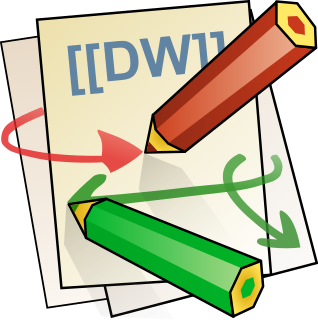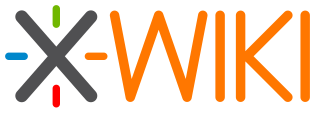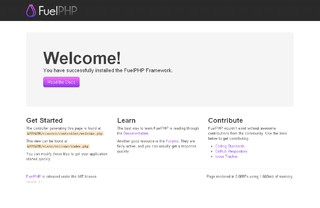
In computing, internationalization and localization (American) or internationalisation and localisation, often abbreviated i18n and L10n, are means of adapting computer software to different languages, regional peculiarities and technical requirements of a target locale.
In computing, gettext is an internationalization and localization system commonly used for writing multilingual programs on Unix-like computer operating systems. One of the main benefits of gettext is that it separates programming from translating. The most commonly used implementation of gettext is GNU gettext, released by the GNU Project in 1995. The runtime library is libintl. gettext provides an option to use different strings for any number of plural forms of nouns, but this feature has no support for grammatical gender.

DokuWiki is a wiki application licensed under GPLv2 and written in the PHP programming language. It works on plain text files and thus does not need a database. Its syntax is similar to the one used by MediaWiki. It is often recommended as a more lightweight, easier to customize alternative to MediaWiki. The 'Doku' in DokuWiki is short for Dokumentation which in German means documentation.
International Components for Unicode (ICU) is an open-source project of mature C/C++ and Java libraries for Unicode support, software internationalization, and software globalization. ICU is widely portable to many operating systems and environments. It gives applications the same results on all platforms and between C, C++, and Java software. The ICU project is a technical committee of the Unicode Consortium and sponsored, supported, and used by IBM and many other companies.

JSON is an open standard file format and data interchange format that uses human-readable text to store and transmit data objects consisting of attribute–value pairs and arrays. It is a common data format with diverse uses in electronic data interchange, including that of web applications with servers.

Git is free and open source software for distributed version control: tracking changes in any set of files, usually used for coordinating work among programmers collaboratively developing source code during software development. Its goals include speed, data integrity, and support for distributed, non-linear workflows.

Mantis Bug Tracker is a free and open source, web-based bug tracking system. The most common use of MantisBT is to track software defects. However, MantisBT is often configured by users to serve as a more generic issue tracking system and project management tool.
The Common Locale Data Repository Project, often abbreviated as CLDR, is a project of the Unicode Consortium to provide locale data in XML format for use in computer applications. CLDR contains locale-specific information that an operating system will typically provide to applications.
In software development, a codebase is a collection of source code used to build a particular software system, application, or software component. Typically, a codebase includes only human-written source code files; thus, a codebase usually does not include source code files generated by tools or binary library files, as they can be built from the human-written source code. However, it generally does include configuration and property files, as they are the data necessary for the build.

XWiki is a free wiki software platform written in Java with a design emphasis on extensibility. XWiki is an enterprise wiki. It includes WYSIWYG editing, OpenDocument based document import/export, semantic annotations and tagging, and advanced permissions management.
In software development, version control is a class of systems responsible for managing changes to computer programs or other collections of information such that revisions have a logical and consistent organization. The following tables include general and technical information on notable version control and software configuration management (SCM) software. For SCM software not suitable for source code, see Comparison of open-source configuration management software.

The Yahoo! User Interface Library (YUI) is a discontinued open-source JavaScript library for building richly interactive web applications using techniques such as Ajax, DHTML, and DOM scripting. YUI includes several core CSS resources. It is available under a BSD License. Development on YUI began in 2005 and Yahoo! properties such as My Yahoo! and the Yahoo! front page began using YUI in the summer of that year. YUI was released for public use in February 2006. It was actively developed by a core team of Yahoo! engineers.
jQuery is a JavaScript library designed to simplify HTML DOM tree traversal and manipulation, as well as event handling, CSS animation, and Ajax. It is free, open-source software using the permissive MIT License. As of Aug 2022, jQuery is used by 77% of the 10 million most popular websites. Web analysis indicates that it is the most widely deployed JavaScript library by a large margin, having at least 3 to 4 times more usage than any other JavaScript library.
Mark Edward Davis is an American specialist in the internationalization and localization of software and the co-founder and president of the Unicode Consortium.
Protocol Buffers (Protobuf) is a free and open-source cross-platform data format used to serialize structured data. It is useful in developing programs to communicate with each other over a network or for storing data. The method involves an interface description language that describes the structure of some data and a program that generates source code from that description for generating or parsing a stream of bytes that represents the structured data.
GitHub, Inc. is an Internet hosting service for software development and version control using Git. It provides the distributed version control of Git plus access control, bug tracking, software feature requests, task management, continuous integration, and wikis for every project. Headquartered in California, it has been a subsidiary of Microsoft since 2018.
The regional indicator symbols are a set of 26 alphabetic Unicode characters (A–Z) intended to be used to encode ISO 3166-1 alpha-2 two-letter country codes in a way that allows optional special treatment.
In version control systems, a repository is a data structure that stores metadata for a set of files or directory structure. Depending on whether the version control system in use is distributed, like Git or Mercurial, or centralized, like Subversion, CVS, or Perforce, the whole set of information in the repository may be duplicated on every user's system or may be maintained on a single server. Some of the metadata that a repository contains includes, among other things, a historical record of changes in the repository, a set of commit objects, and a set of references to commit objects, called heads.
In web development, a polyfill is code that implements a feature on web browsers that do not natively support the feature. Most often, it refers to a JavaScript library that implements an HTML5 or CSS web standard, either an established standard on older browsers, or a proposed standard on existing browsers. Formally, "a polyfill is a shim for a browser API."

FuelPHP is an open-source web application framework written in PHP which implements the HMVC pattern.








